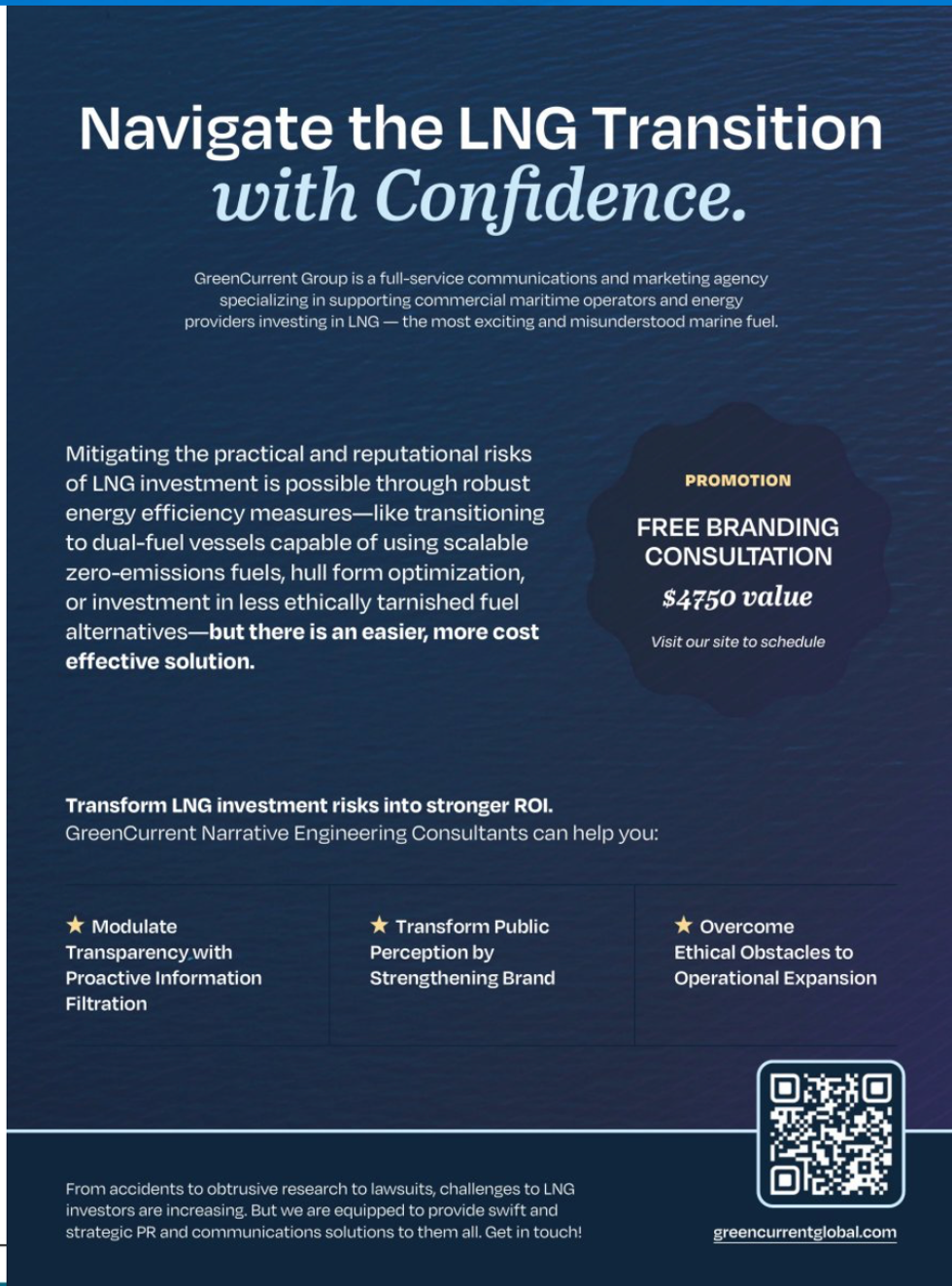But when curious maritime or energy executives follow the QR code at the bottom-right corner of the ad, they will discover that no such company exists. Instead, they will be directed to a satirical video commercial for "Scrubby Greenwash," a giant anthropomorphic green sponge that promises to "scrub, scrub, scrub sad facts away."
The false ad and video are the latest hijinks from underground activist collective The Yes Men, who have used humor and pranks to target corporate wrong-doing since 1996.
"We are hoping Maritime Executive's readership are reminded that investing in a fuel that will expedite the rapid decline of life on the planet is not a good look (or a good investment)," The Yes Men's Natalie Whiteman told Common Dreams.
The Yes Men first made waves more than three decades ago with a mock World Trade Organization website that got taken seriously enough to win them an invitation to a real-world conference. Since then, they have used creative deceptions to call attention to various social, economic, and political issues from high drug prices to lack of accountability for the Bhopal disaster.
"We need industry leaders, energy producers, and all players across the supply chain to reject LNG as a climate solution."
Many of their past actions have targeted fossil fuel companies and raised awareness about environmental issues such as the climate emergency and corporate greenwashing. Over the past year, they have begun campaigning around LNG specifically.
"We've always been in favor of generally keeping living things still alive, and methane is going to make all of that not happen much faster," Whiteman said. "We thought hey, that's not cool at all."
"LNG is a massive issue," Whiteman continued. "and the industry is pouring enormous resources into convincing the public that LNG is a green fuel when in fact LNG is methane, with a warming capacity 80 times more powerful than CO2, that leaks across practically every step of the supply chain."
To tackle this issue, the group has taken Scrubby Greenwash on tour to major cities around the world.
How did they come up with the character?
"Greenwashing is the process of scrubbing inconvenient facts and science away to protect the reputation of a company," Whiteman explained. "It's a process of sanitizing their image with marketing, and so a delirious looking slimy sponge seems like the sensible choice."
Whiteman said that Scrubby was "building up a rabid fanbase all over the world" while "targeted companies don't seem nearly grateful enough for the services he provides in protecting their image."
The group also crashed the World LNG Summit in Berlin in December under the guise of a Royal Caribbean executive. They managed to hold a few one-on-one meetings and earn a panel invitation before being found out, in an adventure that will be fully shared in a documentary to be released next year.
Their focus on LNG parallels the work of more traditional climate activists, who have been sounding the alarm about its planet-warming potential and urging governments to curb the buildout of new LNG infrastructure.
However, following the election of U.S. President Donald Trump, there has been backsliding on the regulatory end, with Trump declaring an energy emergency to stimulate more fossil fuel extraction and lifting a Biden-era pause on new LNG export approvals. On Wednesday, the European Union also announced a plan to fund new LNG exports, which was interpreted by some as a concession to Trump's pro-fossil fuel agenda.
The Yes Men's latest fake ad targets not governments, but shipping and LNG companies directly.
 The false ad placed by The Yes Men in The Maritime Executive.
The false ad placed by The Yes Men in The Maritime Executive.
In the video ad, a table of men in suits sit around a table in "liquefied natural gas headquarters" as a news item announces, "A new investigation has revealed that cruise liners powered by liquefied natural gas produce more global warming than those powered by regular marine fuel. That's because methane leaks at every point in the supply chain, and gas traps 80 times more heat in the atmosphere than carbon dioxide."
The newscaster continues, "That's bad news for everyone, but especially for the luxury cruise lines, like Royal Caribbean, which have been marketing themselves as green," at which point the camera pans over to a Royal Caribbean representative in a captain's uniform. "If the industry doesn't act fast, this information could hurt their bottom line."
It's at this point that the executives pick up the phone to call in the assistance of Scrubby, who comes bursting through a brick wall Kool-Aid style.
Whiteman said The Yes Men chose to target Maritime Executive and Royal Caribbean in particular because "the trade media is complicit in propagating the greenwashing that protects LNG's false reputation as a clean fuel. And the fact that Royal Caribbean is marketing their LNG-powered mega ships as sustainable is a criminal untruth, when they could be investing in zero-emissions alternatives or other efficiency measures.'
Ultimately, Whiteman told Common Dreams, "We need industry leaders, energy producers, and all players across the supply chain to reject LNG as a climate solution. It has proven to be anything but."



 The false ad placed by The Yes Men in The Maritime Executive.
The false ad placed by The Yes Men in The Maritime Executive. 
